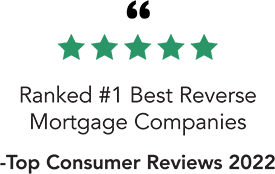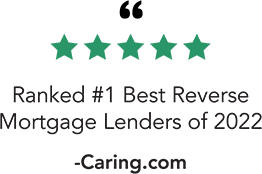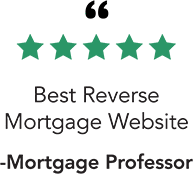
|
All Reverse Mortgage, Inc.Instant Quote from America's #1 Rated Reverse Lender!
|
||||
|
|
|||||

 |
ARLO™REVERSE MORTGAGE
CALCULATOR |
About All Reverse Mortgage (ARLO™)
At All Reverse Mortgage, we are proud to be America’s leading HUD-approved reverse mortgage lender, consistently achieving a stellar 4.99/5 star rating for our impeccable service. Our unwavering commitment to integrity and exceptional customer support has earned us an A+ Exemplary Rating from the Better Business Bureau (BBB), and we were honored as Torch Ethics Finalists in both 2021 and 2022.
Specialized in Reverse Mortgages for 20 Years
With two decades of specialized service, All Reverse Mortgage has become a respected name solely focused on reverse mortgage lending. Our ethical practices have earned repeated nominations for the BBB’s Torch Award. Our consistently high ratings and positive customer feedback highlight our dedication to meeting the needs and enhancing the well-being of our customers. As a HUD-approved direct lender, we are celebrated for our honesty, reliability, and superior service.
Transparent and Cost-Effective
At All Reverse Mortgage, our process is clear and centered around you. We work directly with our clients, eliminating middlemen to ensure greater savings and advantages for you. We choose to invest in quality service over costly celebrity endorsements, maintaining affordable, accessible, and transparent reverse mortgage solutions. Our approach showcases our commitment to providing trustworthy and cost-effective reverse mortgages for our clients.

What is a Reverse Mortgage?
A reverse mortgage is a loan exclusively for homeowners aged 62 and older that allows them to access a portion of their home’s equity tax-free, without requiring mandatory monthly mortgage repayments.
As a homeowner, you maintain ownership and the title to your home. You are also responsible for the ongoing costs associated with property ownership, such as property taxes, homeowners insurance, and maintenance.
Reverse Mortgage Eligibility
Before deciding if a reverse mortgage is right for you, it’s important to understand the requirements that make sure it’s both suitable and beneficial.
Understanding the Basic Requirements:
- Age Requirement: In order to apply for a reverse mortgage loan, you must be at least 62 years of age or older. For married couples, only one spouse must be at least 62 years of age in most states (TX, for example, requires both spouses to be at least 62).
- Primary Residency: Only your primary residence is eligible for a reverse mortgage, which means you must live there for the majority of the year. Vacation homes and rental properties are not eligible.
- Property Types: Eligible properties include single-family homes, owner-occupied 2-4-unit buildings, townhouses, approved condominiums, and certain types of manufactured homes that meet FHA requirements.
- Mandatory Counseling Session: Applicants are required to participate in a HUD-approved counseling session on reverse mortgages. This session can be conducted over the phone or in person and is vital for ensuring that you fully understand the implications of obtaining a reverse mortgage.
- Financial Assessment: Applicants must undergo a thorough financial assessment to evaluate their ability to maintain key financial responsibilities such as property taxes and homeowner’s insurance payments.
Meeting these requirements is essential for obtaining a reverse mortgage and ensuring it is suitable for your situation.
How Much Can You Get From a Reverse Mortgage
When considering a reverse mortgage, a key question is: how much can you borrow? The answer varies, as interest rates are subject to change every week. As rates move down, the percentage you can borrow increases, and when rates increase, the percentage you can borrow decreases.
As of September 2025, the approximate range is 37.6% (age 62) to 72.5% (age 97+) of your home’s value. The amount of proceeds a borrower will receive is also dependent on the mandatory obligations they must pay at closing, including any existing liens against the home and the closing costs associated with the loan.
Factors Influencing Your Loan Amount:
- Your Age: The age of the youngest borrower or spouse is a crucial factor. The older you are, the higher the percentage of your home’s value you can borrow.
- Your Home Value: The higher the value of your home, the larger your loan amount will be.
- Current Interest Rates: The lower the interest rate, the higher the percentage you can borrow.
- Choice of Reverse Mortgage Program: Different programs have different borrowing percentages
Understanding Loan Limits:
- The lending limit for the 2025 HECM (Home Equity Conversion Mortgage) program is capped at $1,209,750.
- If you’re considering a jumbo reverse mortgage, the limit can go up to $4,000,000, depending on your home’s value and other qualifying factors.
Get a Personalized Estimate with ARLO™
For a more specific estimate tailored to your circumstances, consider using ARLO™, our proprietary reverse mortgage calculator. ARLO™ provides real-time rates, eligibility, and personalized guidance to help you select the reverse mortgage program that best fits your financial needs.
Reverse Mortgage Payment Options
Reverse mortgage borrowers have several options for receiving their loan proceeds, each tailored to different needs and financial strategies. Understanding these options is crucial for making an informed choice:
- Line of Credit
- Usage Flexibility: Borrowers can draw funds as needed, aiding in managing living expenses.
- Growth Potential: The unused line of credit grows over time, increasing available funds.
- Ideal for Future Planning: Beneficial for those who don’t need immediate funds but desire a financial backup.
- Term and Tenure Payments
- Term: Offer fixed payments for a specified duration. This can be a strategic choice for those planning to defer Social Security benefits, providing income support in the interim. For example, a 65-year-old deferring Social Security until 70 could use term payments for income during those five years.
- Tenure: Guarantee monthly payments for the loan’s lifetime, continuing even if the payments surpass the home’s value. These payments cease only upon the borrower’s death or permanent relocation. It’s important to continue paying taxes and insurance to avoid loan default.
- Combination: Modified plans combine fixed payments with a line of credit, offering stability and flexibility.
- Lump-Sum Disbursement
- Lump Sum: Suitable for significant immediate expenses like home renovations, medical bills, or to pay off a substantial existing mortgage.
- Fixed-Rate: Allows you to determine the equity portion to use up to the maximum loan amount. For instance, if you are eligible for $80,000 but need only $30,000 for renovations, you can opt for the lower amount.
- Closed-End: This fixed-rate option prevents future borrowing against unused loan amounts. Any additional funds needed would require refinancing the loan.
Consider your financial goals and needs when selecting a disbursement option. For more detailed information on each option, explore our guide, “Exploring 3 Types of Reverse Mortgages.”
Reverse Mortgages for Home Purchase
The reverse mortgage for purchase program is designed to help older Americans maintain greater financial flexibility and improved cash flow. This program particularly benefits those looking to buy a retirement home without fully paying in cash or taking on a new traditional mortgage payment.
Easier Qualifications:
- Simplified Requirements: The qualification process for a typical Reverse Mortgage for Purchase (Home Equity Conversion Mortgage for Purchase or H4P) is generally more straightforward for senior borrowers. This is due to the program’s more lenient underwriting standards, which do not rely on debt-to-income ratios for income qualification.
- Alternative to Cash Buyer: The HECM purchase program offers a valuable alternative for those who prefer not to pay the entire home cost upfront in cash while simultaneously eliminating the need for monthly mortgage payments.
- Ideal for Non-traditional Financing Candidates: This program is particularly advantageous for borrowers who may find it challenging to qualify for conventional financing due to its more accommodating qualification criteria.
Overall, the reverse mortgage for purchase program offers a practical solution for seniors seeking to buy a home in retirement without the financial constraints of traditional mortgage products.
Explore our purchase guide, “Reverse Mortgage Purchase: Down Payment, Rates & Eligibility,” for more detailed program information.
HUD-Approved Counseling Requirements
All borrowers applying for a federally insured HECM loan must undergo reverse mortgage counseling. Depending on your location, counseling sessions may occur over the phone or in person.
The counseling agency’s role is multifaceted:
- Provide unbiased education about reverse mortgages and other financial options to help consumers make informed decisions.
- Review public and private benefits that could be available to you to help pay for expenses.
For a thorough budget analysis, counselors will need the following information:
- Your income
- Assets
- Debts
- Monthly living expenses
Upon completing your counseling session, you will be issued a counseling certificate. You must sign and deliver this certificate to us for your loan application. Certain states have additional “cooling-off” requirements, prohibiting lenders from processing your loan for a specified amount of time once counseling is complete.
As a HUD-approved reverse mortgage lender, we must provide a list of at least 10 counseling agencies from which to choose. The FHA mandates five of these agencies, including the National Council on Aging.
We can process your loan only after we receive your completed application, your signed counseling certificate, and after any additional waiting periods required by state laws.
Current Interest Rates
- Adjustable rates from 5.375% (1.750 margin)
- Fixed rates from 7.560% (9.080% APR)
Learn all about reverse mortgage interest rates and how they affect your available loan and future home equity position.
Repayment and Loan Maturity
Reverse mortgages offer a unique financial arrangement, as they don’t require monthly payments while the borrower(s) reside in the home. The loan’s repayment is triggered when a maturity event occurs. The most common maturity event is the passing of the last surviving borrower or eligible non-borrowing spouse.
However, a loan also reaches maturity if the borrower(s) cease to occupy the property as their primary residence or fail to maintain the property taxes and homeowners insurance.
If a reverse mortgage borrower is faced with the need to move out of the home to an assisted living facility, for example, they will want to make arrangements to pay off the loan by either refinancing to another loan product type or by selling the home.
When Repayment Becomes Necessary
The loan must be repaid once it becomes due. Borrowers and heirs should be prepared for this eventuality.
Here are some recommended steps to ensure a smooth process:
- Title Transfer to Heirs: Secure the property’s title in the heir’s name. This could involve adding heirs to the title even before the borrower’s passing, as long as one original borrower remains on the title. Since probate might be necessary after the borrower’s death, consulting with an estate attorney beforehand is advisable to navigate your situation and state laws effectively.
- Property Valuation: Engage a local real estate expert to accurately estimate the home’s probable selling price.
- Loan Balance vs. Property Value: Assess the home’s value or probable selling price against the loan’s outstanding balance.
- Making a Decision: Based on this information, decide whether to refinance the loan, satisfy the balance with other funds, or sell the property. The loan’s balance can be settled if the home’s value and probable selling price indicate equity. However, heirs can sell the home at 95% of the current home value, even if the loan balance is higher.
Non-Recourse Loan Benefits
A reverse mortgage is a non-recourse loan, meaning that if the heirs choose not to retain or sell the property, they can turn it over to the lender by deed in lieu of foreclosure. In such cases, the lender’s recourse is limited to the property. Importantly, even if the loan balance surpasses the property’s value, the heirs are not liable for the excess amount.
Evaluating if it’s Right For You
Reverse Mortgage loans are not right for everyone. It may surprise you to hear a lender say this, but it is true. If you are looking for a short-term loan, you may be better suited for a different type of financing.
Considerations for Short-Term Financial Needs: If your financial needs are short-term, alternative financing options may be more suitable. Reverse mortgages, including the Home Equity Conversion Mortgage (HECM), typically have higher closing costs, which include mortgage insurance premiums. These expenses can render reverse mortgages less advantageous for those not planning to remain in their homes long-term.
Educating Yourself and Your Family: We strongly encourage you and your family to become well-informed about these loans. Our detailed guide explores the pros and cons and outlines the safeguards, enabling you to make a well-informed decision supporting your long-term financial goals and living arrangements.
Ready to learn more? All Reverse Mortgage, Inc. (ARLO™) is here to help. Access our reverse mortgage calculator to estimate your loan, or call us Toll-Free at (800) 565-1722. We’re here to help you make informed decisions, allowing you to continue enjoying your retirement.




